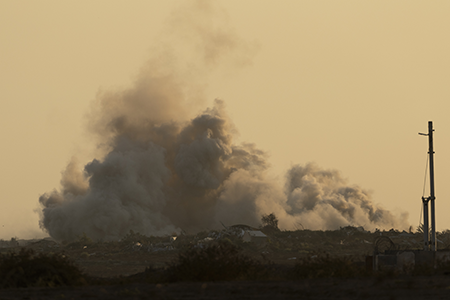Gaza Tensions Complicate Iranian Nuclear Threat
September 2024
By Barbara Slavin
The next president’s ability to handle the simmering issue of Iran’s advancing nuclear program will be complicated by Tehran’s growing regional influence and the spiraling Gaza war, which was triggered by Hamas’ heinous October 7 attack on Israel and since has embroiled Iran and other Iran-backed militant groups in various ways.

Former President Donald Trump, who withdrew the United States in 2018 from the nuclear deal with Iran known as the Joint Comprehensive Plan of Action (JCPOA), has long insisted that he could negotiate a better deal. Like presidents before and after him, he also has said that he would never allow Iran to develop nuclear weapons and has advocated a policy of “maximum pressure.”1 Informed of an alleged Iranian plot to kill him in retaliation for his order to assassinate Iran’s most important general, Qassem Soleimani, in 2020, Trump threatened “to wipe [Iran] off the face of the earth” if Tehran succeeded.2
Vice President Kamala Harris has not laid out views on Iran that differ significantly from the Biden administration approach. She has demonstrated more empathy than President Joe Biden for the Palestinians, however, and spoken of the intensifying Israeli-Hamas conflict as not a “binary” matter, suggesting a nuanced understanding of the region and support for diplomacy.3 In this, she has been helped by her national security adviser, Philip Gordon, who nearly two decades ago criticized the George W. Bush administration for “benign neglect” toward European-led nuclear talks with Iran and wrote a book opposing the Bush policy of forceful regime change in the Middle East.4
Despite the plethora of other crises likely to face the next president, deescalating tensions with Iran should remain a priority. The best approach would be ending the Gaza war in a durable manner. As long as that war continues, the danger of a wider conflagration remains, eroding any hope of reaching new understandings with Iran on any topic.
If relative peace could be established, the next administration should embrace a step-by-step approach that diminishes Iran’s incentive to move from threshold nuclear status to nuclear- weapon-possessor state. As others have suggested, there should be a series of reciprocal concessions by the United States on sanctions and by Iran on transparency and monitoring.5
Iran just inaugurated a new president, who has stressed the need for sanctions relief to boost the country’s battered economy. He has assembled a team of advisers that includes key figures who negotiated the JCPOA. To stabilize the Iran file before leaving office, the lame-duck Biden administration should resume contacts with Iran via Oman and Iran’s UN mission in New York.
If Harris wins, the United States will be well positioned to continue such work. If Trump is elected, the prospects for diplomacy with Tehran are less certain but not impossible. As one former Trump adviser said recently, “As long as you call it the ‘Trump Plan of Action and not JCPOA 2.0,’ and tell Trump he could win a Nobel prize, diplomacy with Iran can proceed.”6
ENDNOTES
1. “Remarks by President Donald Trump on Iran,” January 8, 2020, https://trumpwhitehouse.archives.gov/briefings-statements/remarks-president-trump-iran/.
2. “Trump: ‘If Iran Assassinates Me, U.S. Must Wipe It Off the Face of the Earth,’” Agence France-Presse, July 26, 2024.
3. “Remarks by Vice President Harris Following Meeting With Prime Minister Benjamin Netanyahu of Israel,” The White House, July 25, 2024, https://www.whitehouse.gov/briefing-room/speeches-remarks/2024/07/25/remarks-by-vice-president-harris-following-meeting-with-prime-minister-benjamin-netanyahu-of-israel/.
4. Barbara Slavin, Bitter Friends, Bosom Enemies: Iran, the U.S. and the Twisted Path to Confrontation (New York: St. Martin’s Press, 2007), p. 212; Philip H. Gordon, Losing the Long Game: The False Promise of Regime Change in the Middle East (New York: St. Martin’s Press, 2020).
5. Kelsey Davenport, “Constraining Iran’s Nuclear Potential in the Absence of the JCPOA,” Arms Control Association Policy White Paper, July 2024, https://www.armscontrol.org/sites/default/files/files/PolicyPapers/ACA_PolicyPaper_Iran_2024.pdf.
6. Confidential comment to the author at a recent Track 1.5 meeting with Iranians.
Barbara Slavin is a distinguished fellow at the Stimson Center and editor of Middle East Perspectives.
